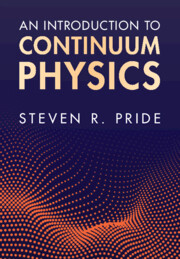Book contents
- Frontmatter
- Contents
- Preface
- Part I Continuum Physics
- 1 An Introduction to Tensor Calculus
- 2 Continuum Mechanics
- 3 Continuum Theory of Electromagnetism and Gravity
- 4 Elasticity and Elastodynamics
- 5 Fluid Dynamics
- 6 Equilibrium Thermodynamics
- 7 Nonequilibrium Diffusive Transport
- Part II Mathematical Methods
- References
- Index
6 - Equilibrium Thermodynamics
from Part I - Continuum Physics
Published online by Cambridge University Press: 06 February 2025
- Frontmatter
- Contents
- Preface
- Part I Continuum Physics
- 1 An Introduction to Tensor Calculus
- 2 Continuum Mechanics
- 3 Continuum Theory of Electromagnetism and Gravity
- 4 Elasticity and Elastodynamics
- 5 Fluid Dynamics
- 6 Equilibrium Thermodynamics
- 7 Nonequilibrium Diffusive Transport
- Part II Mathematical Methods
- References
- Index
Summary
The extensive thermodynamic variables of a fluid are introduced as the internal energy, volume, and number of molecules. The entropy is defined and also shown to be extensive. Taking the total derivative of the internal energy produces the first law of thermodynamics and defines the intensive parameters of temperature, pressure, and chemical potential. Changing variables from extensive variables to intensive variables is accomplished with the Legendre transform and defines alternative energies such as the Helmholtz free energy, enthalpy, and Gibbs free energy. Thermodynamic equilibrium requires that each element of a system have the same temperature, pressure, and chemical potential. For equilibrium to be stable, the material properties of each element must satisfy certain derived constraints. First-order phase transition are treated for a single-species system. Multispecies systems are treated and a widely used expression for how the chemical potentials of each species depend on the concentration of the species is derived. Chemical reactions are treated as is osmosis. The thermodynamics of solid systems is addressed along with mineral solubility in liquid solutions.
Keywords
- Type
- Chapter
- Information
- An Introduction to Continuum Physics , pp. 313 - 392Publisher: Cambridge University PressPrint publication year: 2025

